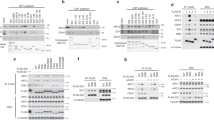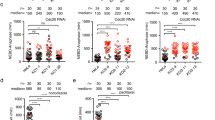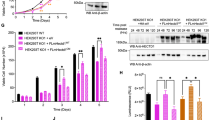Abstract
General transcription factor IIH (TFIIH) consists of nine subunits: cyclin-dependent kinase 7 (Cdk7), cyclin H and MAT1 (forming the Cdk-activating-kinase or CAK complex), the two helicases Xpb/Hay and Xpd, and p34, p44, p52 and p62 (refs 1–3). As the kinase subunit of TFIIH, Cdk7 participates in basal transcription by phosphorylating the carboxy-terminal domain of the largest subunit of RNA polymerase II1,4,5. As part of CAK, Cdk7 also phosphorylates other Cdks, an essential step for their activation6,7,8,9. Here we show that the Drosophila TFIIH component Xpd negatively regulates the cell cycle function of Cdk7, the CAK activity. Excess Xpd titrates CAK activity, resulting in decreased Cdk T-loop phosphorylation, mitotic defects and lethality, whereas a decrease in Xpd results in increased CAK activity and cell proliferation. Moreover, Xpd is downregulated at the beginning of mitosis when Cdk1, a cell cycle target of Cdk7, is most active. Downregulation of Xpd thus seems to contribute to the upregulation of mitotic CAK activity and to regulate mitotic progression positively. Simultaneously, the downregulation of Xpd might be a major mechanism of mitotic silencing of basal transcription.
This is a preview of subscription content, access via your institution
Access options
Subscribe to this journal
Receive 51 print issues and online access
$199.00 per year
only $3.90 per issue
Buy this article
- Purchase on Springer Link
- Instant access to full article PDF
Prices may be subject to local taxes which are calculated during checkout




Similar content being viewed by others
References
Frit, P., Bergmann, E. & Egly, J. M. Transcription factor IIH: A key player in the cellular response to DNA damage. Biochimie 81, 27–38 (1999)
Egly, J. M. The 14th Datta Lecture. TFIIH: From transcription to clinic. FEBS Lett. 498, 124–128 (2001)
Austin, R. J. & Biggin, M. D. Purification of the Drosophila RNA polymerase II general transcription factors. Proc. Natl Acad. Sci. USA 93, 5788–5792 (1996)
Akoulitchev, S., Makela, T. P., Weinberg, R. A. & Reinberg, D. Requirement for TFIIH kinase activity in transcription by RNA polymerase II. Nature 377, 557–560 (1995)
Makela, T. P. et al. A kinase-deficient transcription factor TFIIH is functional in basal and activated transcription. Proc. Natl Acad. Sci. USA 92, 5174–5178 (1995)
Nigg, E. A. Cyclin-dependent protein kinases: Key regulators of the eukaryotic cell cycle. BioEssays 17, 471–480 (1995)
Morgan, D. O. Cyclin-dependent kinases: Engines, clocks, and microprocessors. Annu. Rev. Cell Dev. Biol. 13, 261–291 (1997)
Morgan, D. O. Principles of CDK regulation. Nature 374, 131–134 (1995)
Larochelle, S., Pandur, J., Fisher, R. P., Salz, H. K. & Suter, B. Cdk7 is essential for mitosis and for in vivo Cdk-activating kinase activity. Genes Dev. 12, 370–381 (1998)
Fisher, R. P. & Morgan, D. O. CAK in TFIIH: Crucial connection or confounding coincidence? Biochim. Biophys. Acta 1288, O7–O10 (1996)
Foe, V. E., Odekk, G. M. & Edgar, B. A. in The Development of Drosophila melanogaster (eds Bate, M. & Martinez-Arias, A.) 149–300 (Cold Spring Harbor Laboratory Press, Cold Spring Harbor, New York, 1993)
Edgar, B. A., Sprenger, F., Duronio, R. J., Leopold, P. & O'Farrell, P. H. Distinct molecular mechanism regulate cell cycle timing at successive stages of Drosophila embryogenesis. Genes Dev. 8, 440–452 (1994)
Sandrock, B. & Egly, J. M. A yeast four-hybrid system identifies Cdk-activating kinase as a regulator of the XPD helicase, a subunit of transcription factor IIH. J. Biol. Chem. 276, 35328–35333 (2001)
Wallenfang, M. R. & Seydoux, G. cdk-7 Is required for mRNA transcription and cell cycle progression in Caenorhabditis elegans embryos. Proc. Natl Acad. Sci. USA 99, 5527–5532 (2002)
Clemens, J. C. et al. Use of double-stranded RNA interference in Drosophila cell lines to dissect signal transduction pathways. Proc. Natl Acad. Sci. USA 97, 6499–6503 (2000)
Gottesfeld, J. M. & Forbes, D. J. Mitotic repression of the transcriptional machinery. Trends Biochem. Sci. 22, 197–202 (1997)
Long, J. J., Leresche, A., Kriwacki, R. W. & Gottesfeld, J. M. Repression of TFIIH transcriptional activity and TFIIH-associated cdk7 kinase activity at mitosis. Mol. Cell. Biol. 18, 1467–1476 (1998)
Akoulitchev, S. & Reinberg, D. The molecular mechanism of mitotic inhibition of TFIIH is mediated by phosphorylation of CDK7. Genes Dev. 12, 3541–3550 (1998)
Larochelle, S. et al. T-loop phosphorylation stabilizes the CDK7-cyclin H-MAT1 complex in vivo and regulates its CTD kinase activity. EMBO J. 20, 3749–3759 (2001)
Foe, V. E. & Alberts, B. M. Reversible chromosome condensation induced in Drosophila embryos by anoxia: visualization of interphase nuclear organization. J. Cell Biol. 100, 1623–1636 (1985)
Maldonado-Codina, G., Llamazares, S. & Glover, D. M. Heat shock results in cell cycle delay and synchronisation of mitotic domains in cellularised Drosophila melanogaster embryos. J. Cell Sci. 105, 711–720 (1993)
Acknowledgements
We thank M. Zurita for hsp–xpd transgenic flies and the xpd cDNA clone; M. Fuller for anti-(Xpb/Hay) antibody, hsp–xpb/hay transgenic flies and xpb/hay cDNA clone; T. Schüpbach, W. J. Mackay and B.-Z. Shilo for fly strains; R. Tanguay for providing S2 cells; M. Miron, O. Johnstone and M. Lindor for technical assistance with the cell culture; B. Hu for microinjection of the hsp–xpdC construct; A. Tsang for use of the confocal microscope; A. Spurmanis for technical assistance; P. Lasko for the use of the Axioplan microscope; R. Roy for use of the PhosphorImager; and R. Roy, N. Mashrouha and M. Cavey for their critical reading of the manuscript. This work was supported by the National Cancer Institute of Canada with funds from the Canadian Cancer Society. B.S. was a research scientist of the National Cancer Institute of Canada supported by funds from the Canadian Cancer Society and is now a Canadian Institute of Health Research investigator. J.C. was a recipient of a studentship from the Fonds pour la formation de chercheurs et l'aide à la recherche (FCAR Quebec).
Author information
Authors and Affiliations
Corresponding author
Ethics declarations
Competing interests
The authors declare that they have no competing financial interests.
Supplementary information
41586_2003_BFnature01746_MOESM4_ESM.doc
Supplementary Information: Describes the identification of xpd as a dominant suppressor of cdk7ts1. Antibody methods section. Figure legends for the SI Figures 1 – 3. (DOC 67 kb)
Rights and permissions
About this article
Cite this article
Chen, J., Larochelle, S., Li, X. et al. Xpd/Ercc2 regulates CAK activity and mitotic progression. Nature 424, 228–232 (2003). https://doi.org/10.1038/nature01746
Received:
Accepted:
Issue Date:
DOI: https://doi.org/10.1038/nature01746
This article is cited by
-
Lineage-specific control of TFIIH by MITF determines transcriptional homeostasis and DNA repair
Oncogene (2019)
-
Crumbs interacts with Xpd for nuclear division control in Drosophila
Oncogene (2015)
-
Cyclin-dependent kinases
Genome Biology (2014)
-
The role of XPD in cell apoptosis and viability and its relationship with p53 and cdk2 in hepatoma cells
Medical Oncology (2012)
-
Nucleotide Excision Repair Gene Subunit XPD is Highly Expressed in Cervical Squamous Cell Carcinoma
Pathology & Oncology Research (2012)
Comments
By submitting a comment you agree to abide by our Terms and Community Guidelines. If you find something abusive or that does not comply with our terms or guidelines please flag it as inappropriate.



